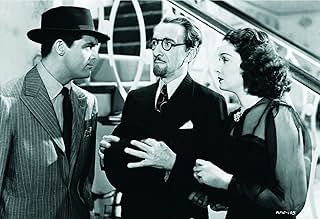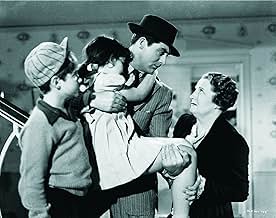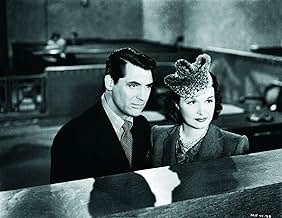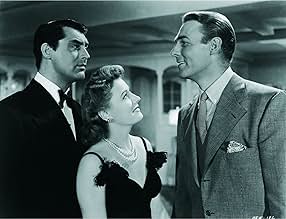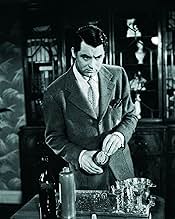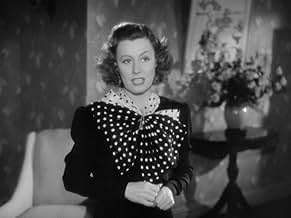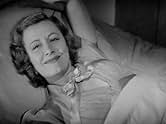NOTE IMDb
7,2/10
12 k
MA NOTE
Disparue depuis sept ans et présumée morte, une femme rentre chez elle le jour du deuxième mariage de son mari.Disparue depuis sept ans et présumée morte, une femme rentre chez elle le jour du deuxième mariage de son mari.Disparue depuis sept ans et présumée morte, une femme rentre chez elle le jour du deuxième mariage de son mari.
- Réalisation
- Scénario
- Casting principal
- Nommé pour 3 Oscars
- 3 victoires et 3 nominations au total
Jean Acker
- Postponed Case Witness
- (non crédité)
Murray Alper
- Yosemite Bartender
- (non crédité)
Leon Belasco
- Waiter - Pacific Club Poolside
- (non crédité)
Joe Cabrillas
- Phillip
- (non crédité)
Bill Cartledge
- Page Boy Paging Burkett
- (non crédité)
Chester Clute
- Shoe Salesman
- (non crédité)
Corky
- Corky the Dog
- (non crédité)
Avis à la une
After his shipwrecked wife is declared dead and he takes on a new wife, Grant's first wife resurfaces, rescued after seven years on an island. This reteaming of Grant and Dunne after their success with "The Awful Truth" is pretty funny for the most part, as Grant tries to solve the problem of one wife too many while dealing with jealousy after learning that Dunne had a male companion (Scott) on that island. The only complaint is that the laughs stop in the last quarter of the movie, which is rather uninteresting as the focus shifts from comedy to romance. Bates, who is hilarious as a flustered judge, died in July 1940 but managed to act in 12 films released that year!
From the opening moments, when the big wooden doors part and usher us into a beautifully spare art deco courtroom with slanting shafts of sunlight enhancing the clean architectural lines, we know that this is going to be a deftly-made, elegant film. What follows does not disappoint us.
Attorney Nick Arden (Cary Grant) lost his wife Ellen in a shipwreck in the Pacific seven years ago. He has now decided to have her declared officially dead, so that he will be free to marry Bianca (Gail Patrick). The irascible judge eventually accedes to both the declaration and the marriage, and the newly-weds set off for a honeymoon in Yosemite. Meanwhile, who should turn up at the Arden residence, very much alive, but the long-lost Ellen? When she hears of the recent marriage, she heads straight for the honeymooners' hotel ...
"My Favourite Wife" is a fine example of those early Cary Grant farces, the ones in which he gawps with surprise, double-takes and mutters to himself as only he can. Irene smoke-gets-in-your-eyes Dunn is great as Ellen, unveiling a hitherto unsuspected gift for witty comedy. Scotty Beckett and Mary Lou Harrington come close to stealing the show as the Ardens' cute little kids. Randolph Scott is interestingly cast as Steve Burkett, the muscle-bound Adonis who spent seven years on the desert island with Ellen.
Some of the film's highlights are worth mentioning here, like the superimposition of Burkett performing gymnastic feats alongside Nick Arden's troubled face as he muses at his desk, conveying with economy the husband's jealous preoccupation. It is unfair to give away a film's jokes, but one gag which lose nothing in the telling is Ellen's outfit at the Yosemite hotel. She has been out of circulation for seven years, and she looks comically untrendy in her 1932 polkadots and lapels, and obtrusive hat. Watch for the derisive glances from the other hotel guests.
Such a light, charming piece of entertainment is hard to fault, but the film does have some shortcomings. Its central problem, which is not resolved, is what to do with Bianca. She married Nick in good faith and has done nothing wrong, yet she is neglected by Nick. Because there is no satisfactory way of dealing with her, she is simply dropped. Ellen's return from a watery grave after all those years would be a news story of international importance, but instead she arrives home having hitched a ride in a truck. Her entry into the country seems to have gone unannounced, even to her husband. The scene in which she persuades a shoe store clerk to pose as 'Adam' in front of Nick has enormous comic potential, but is abandoned after a few seconds. Nick's sleeping-in-the-attic scene is far too long for the humour it contains.
However, the film is a pleasant and very amusing romp, and such weaknesses as it contains do not detract from its appeal.
Attorney Nick Arden (Cary Grant) lost his wife Ellen in a shipwreck in the Pacific seven years ago. He has now decided to have her declared officially dead, so that he will be free to marry Bianca (Gail Patrick). The irascible judge eventually accedes to both the declaration and the marriage, and the newly-weds set off for a honeymoon in Yosemite. Meanwhile, who should turn up at the Arden residence, very much alive, but the long-lost Ellen? When she hears of the recent marriage, she heads straight for the honeymooners' hotel ...
"My Favourite Wife" is a fine example of those early Cary Grant farces, the ones in which he gawps with surprise, double-takes and mutters to himself as only he can. Irene smoke-gets-in-your-eyes Dunn is great as Ellen, unveiling a hitherto unsuspected gift for witty comedy. Scotty Beckett and Mary Lou Harrington come close to stealing the show as the Ardens' cute little kids. Randolph Scott is interestingly cast as Steve Burkett, the muscle-bound Adonis who spent seven years on the desert island with Ellen.
Some of the film's highlights are worth mentioning here, like the superimposition of Burkett performing gymnastic feats alongside Nick Arden's troubled face as he muses at his desk, conveying with economy the husband's jealous preoccupation. It is unfair to give away a film's jokes, but one gag which lose nothing in the telling is Ellen's outfit at the Yosemite hotel. She has been out of circulation for seven years, and she looks comically untrendy in her 1932 polkadots and lapels, and obtrusive hat. Watch for the derisive glances from the other hotel guests.
Such a light, charming piece of entertainment is hard to fault, but the film does have some shortcomings. Its central problem, which is not resolved, is what to do with Bianca. She married Nick in good faith and has done nothing wrong, yet she is neglected by Nick. Because there is no satisfactory way of dealing with her, she is simply dropped. Ellen's return from a watery grave after all those years would be a news story of international importance, but instead she arrives home having hitched a ride in a truck. Her entry into the country seems to have gone unannounced, even to her husband. The scene in which she persuades a shoe store clerk to pose as 'Adam' in front of Nick has enormous comic potential, but is abandoned after a few seconds. Nick's sleeping-in-the-attic scene is far too long for the humour it contains.
However, the film is a pleasant and very amusing romp, and such weaknesses as it contains do not detract from its appeal.
A curious one that leaves a mildly bitter taste in the mouth. It's funny alright (but never hilarious), and the acting from - and chemistry between - Irene Dunne and Cary Crant is exquisite as always. But the film's fundamental problem is that none of the characters are particularly likable. Throughout the film three of the four main characters take their turn to behave despicably, yet the new wife - a woman who's merely unpleasant - is the villain of the piece; constantly the butt of jokes and fair game for ridicule even though she's done absolutely nothing to warrant it. At times it's like watching two spoilt brats from the Hamptons bullying their visiting second-cousin from the Bronx.
The script is also strangely stunted, best witnessed in the scenes before the judge. They really should have been classic screwball moments - the ingredients were there - yet between the lengthy silences and repetitive parrot-dialogue it falls almost completely flat. The gaping plot holes and poor script continuity can't be forgiven either, even allowing for the fact the film's seventy years old.
Don't get me wrong, I laughed, and I enjoyed myself, and I thought it was a decent film. It's just that the character's actions don't stand up too well under scrutiny.
The script is also strangely stunted, best witnessed in the scenes before the judge. They really should have been classic screwball moments - the ingredients were there - yet between the lengthy silences and repetitive parrot-dialogue it falls almost completely flat. The gaping plot holes and poor script continuity can't be forgiven either, even allowing for the fact the film's seventy years old.
Don't get me wrong, I laughed, and I enjoyed myself, and I thought it was a decent film. It's just that the character's actions don't stand up too well under scrutiny.
Cary Grant makes this the best of the numerous versions of the script -- later attempted as SOMETHING'S GOT TO GIVE (Marilyn Monroe's last film) and remade as MOVE OVER, DARLING.
Just the expressions Grant has on his face make this worth watching. It's a delightful look at him in a classic comic predicament -- a man who thinks his first wife is dead discovers on his honeymoon night with his second wife that wife #1 is still amongst the living. The next complication: she has spent 7 years with another man -- and Grant gets to do his best as the jealous husband.
This is just plain funny.
Just the expressions Grant has on his face make this worth watching. It's a delightful look at him in a classic comic predicament -- a man who thinks his first wife is dead discovers on his honeymoon night with his second wife that wife #1 is still amongst the living. The next complication: she has spent 7 years with another man -- and Grant gets to do his best as the jealous husband.
This is just plain funny.
I agree that Move Over Darling is a very good remake of My Favorite Wife, but Doris Day and James Garner, much as I like them, cannot reach the level of sophistication of Grant/Dunne. Randolph Scott does nothing to detract from the picture. Certainly no more than Chuck Connors does in the same role in Move Over Darling. The courtroom scenes with Grant and Granville Bates as the judge are superior, and Donald McBride as the hotel clerk is exceptional. Cary Grant's facial expression on the elevator when he first sees Dunne after 7 years is so memorable that I can still remember it 35 years after first seeing it. If you are a Grant fan, you have to see this movie.
Le saviez-vous
- AnecdotesCary Grant and Randolph Scott, who play rivals in this film, lived together on and off between 1932 and 1944.
- GaffesWhen Ellen has her first hot shower in seven years, she wears a bathing cap rather than washing her hair in the shower.
- Citations
Nick Arden: I came here with my wife... hum... my bride really. Now my wife, not my bride... my wife... Why should I bore you with details?
Hotel clerk: I won't be bored.
Nick Arden: Listen, it's just simple as A B C.
Hotel clerk: Don't tell me you got someone in B?
- Crédits fousRather than the normal "The End" title as the movie concludes, "Good Night" is drawn in cursive handwriting.
- ConnexionsEdited into Marilyn: Something's Got to Give (1990)
- Bandes originalesJingle Bells
(1857) (uncredited)
Written by James Pierpont
Played as part of the score when Cary Grant dons his Santa Claus costume
Meilleurs choix
Connectez-vous pour évaluer et suivre la liste de favoris afin de recevoir des recommandations personnalisées
Everything New on HBO Max in August
Everything New on HBO Max in August
Looking for something different to add to your Watchlist? Take a peek at what movies and TV shows are coming to HBO Max this month.
- How long is My Favorite Wife?Alimenté par Alexa
Détails
- Durée
- 1h 28min(88 min)
- Couleur
- Rapport de forme
- 1.37 : 1
Contribuer à cette page
Suggérer une modification ou ajouter du contenu manquant


